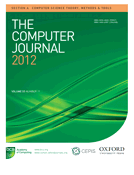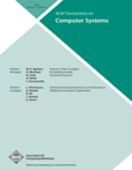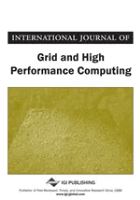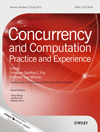
JOURNAL OF SUPERCOMPUTING
Scope & Guideline
Unraveling the Complexities of Theoretical Computer Science
Introduction
Aims and Scopes
- High-Performance Computing (HPC):
Research on algorithms and architectures designed to maximize computational efficiency and performance in supercomputing applications. - Distributed Computing Systems:
Studies involving the design and optimization of systems that utilize multiple computing resources to solve large-scale problems effectively. - Machine Learning and AI Integration:
Exploration of machine learning techniques and artificial intelligence applications within HPC frameworks to enhance data processing and analysis. - Cloud and Edge Computing:
Investigations into the deployment and management of cloud and edge computing resources, including task scheduling and resource allocation. - Data Security and Privacy:
Research focused on securing data in supercomputing environments, with an emphasis on privacy-preserving techniques and secure communication protocols. - Applications in Scientific Research:
Case studies and applications in various scientific domains, utilizing supercomputing capabilities to solve complex problems such as simulations in physics, biology, and engineering.
Trending and Emerging
- Quantum Computing:
Research on quantum computing algorithms and their integration with traditional HPC systems is gaining momentum, driven by the potential for exponential speedup in computation. - AI and Deep Learning Applications:
The integration of AI and deep learning techniques in supercomputing to enhance predictive analytics and automation is becoming a central focus area. - Energy Efficiency and Sustainability:
There is a growing emphasis on energy-efficient computing solutions and sustainable practices in supercomputing, with research dedicated to reducing the carbon footprint of HPC systems. - Federated Learning and Privacy-Preserving Techniques:
Emerging interest in federated learning frameworks that allow for collaborative machine learning while preserving data privacy is becoming increasingly prevalent. - Real-Time Data Processing:
Research on real-time processing of large data streams, particularly in the context of IoT and edge computing, is trending as applications demand immediate data insights.
Declining or Waning
- Traditional Parallel Computing Techniques:
As newer algorithms and architectures emerge, traditional parallel computing methods are becoming less emphasized in favor of more innovative approaches. - Static Resource Management Strategies:
Research focused on static resource allocation models is declining as dynamic and adaptive resource management techniques gain more attention due to their efficiency. - Basic Algorithmic Studies:
Papers focusing solely on foundational algorithms without application to real-world problems are becoming less frequent, as practical applications are prioritized. - Low-Level Hardware Optimization:
While still relevant, there is a noticeable reduction in publications specifically targeting low-level hardware optimization, as research shifts towards higher-level abstractions and software-centric approaches.
Similar Journals

COMPUTER JOURNAL
Exploring the Intersection of Algorithms and ApplicationsCOMPUTER JOURNAL, published by Oxford University Press, is a distinguished platform for innovative research in the field of computer science, with a focus on general and miscellaneous aspects. The journal, established in 1967, continues to advance the boundaries of knowledge in computational technologies, algorithms, and interdisciplinary applications, contributing to its impressive ranking of Q2 in the 2023 Scopus category for Computer Science. With a robust ISSN of 0010-4620 and E-ISSN 1460-2067, it serves as a vital resource for researchers, professionals, and students seeking to stay at the forefront of technological advancements. Though not an open-access journal, it provides numerous access options via institutional subscriptions, making its high-impact articles widely available, especially as the journal bridges over five decades of research from 1967 to 2024. The COMPUTER JOURNAL is committed to fostering scholarly communication and ensuring that critical insights in the ever-evolving realm of computer science reach a diverse audience, thus solidifying its role as an essential resource in academia.

ACM TRANSACTIONS ON COMPUTER SYSTEMS
Unveiling Trends and Transformations in Computer ScienceACM Transactions on Computer Systems (ISSN: 0734-2071, E-ISSN: 1557-7333), published by the Association for Computing Machinery, stands as a leading journal in the field of computer science, particularly known for its focus on the design and performance of computer systems. Since its inception in 1983, the journal has fostered significant advancements in areas such as operating systems, networking, and distributed systems, making invaluable contributions to both academia and industry. Consistently ranked in the second quartile (Q2) of computer science journals, it holds a commendable position at #81 out of 232 in the Scopus rankings, reflecting its robust impact and relevance, with a percentile of 65th among general computer science publications. Although the journal does not currently offer open access options, its high-quality peer-reviewed content remains essential reading for researchers and professionals keen on deepening their understanding of computer systems and their evolution until 2024 and beyond. Engaging with this journal not only keeps one informed of the latest trends but also serves as an excellent platform for scholarly communication and collaboration.

International Journal of Grid and High Performance Computing
Illuminating the Future of Computational PerformanceThe International Journal of Grid and High Performance Computing, published by IGI Global, is a vital resource in the fields of grid and high-performance computing. With an ISSN of 1938-0259 and an E-ISSN of 1938-0267, this journal has been dedicated to advancing knowledge and innovation since its inception in 2009, and is set to continue publishing groundbreaking research until 2024. Despite its current Q4 categorization in the Computer Networks and Communications field, the journal plays a crucial role in fostering interdisciplinary collaboration and sharing pioneering work that addresses the growing demands of computational performance and network efficiency. Although it does not offer open access, subscribers gain invaluable insights into contemporary issues and developments within this rapidly evolving discipline. The journal aims to attract original research articles, reviews, and case studies, making it an essential platform for researchers, professionals, and students keen on exploring the complexities of grid computing and its applications.

International Journal of Advanced Computer Science and Applications
Empowering Innovation Through Open Access Knowledge.International Journal of Advanced Computer Science and Applications, published by SCIENCE & INFORMATION SAI ORGANIZATION LTD, stands as a significant platform in the ever-evolving field of computer science. With its ISSN 2158-107X and E-ISSN 2156-5570, the journal aims to disseminate high-quality research and innovations from diverse areas within computer science, embracing cutting-edge technologies and methodologies. As of 2023, it holds a commendable Q3 ranking in the field, placing it among a competitive cohort of journals while showcasing its commitment to scholarly excellence. The journal operates under an open access model, ensuring that its content is widely accessible to researchers, professionals, and students alike, thereby fostering a collaborative environment for knowledge-sharing and advancing the discipline. With a history of converged contributions from 2017 to 2024, the International Journal of Advanced Computer Science and Applications serves as a vital resource for those seeking to stay at the forefront of computer science research and applications.

Proceedings of the ACM on Measurement and Analysis of Computing Systems
Exploring the Nexus of Measurement and System ReliabilityProceedings of the ACM on Measurement and Analysis of Computing Systems, published by the Association for Computing Machinery, is a pivotal journal in the realms of Computer Science and Engineering, particularly esteemed for its comprehensive focus within the fields of Computer Networks and Communications, Hardware and Architecture, and Safety, Risk, Reliability and Quality. With an impactful presence since its convergence in 2019—and now spanning from 2021 to 2024—this journal upholds rigorous standards, reflected in its classification as Q1 in Computer Science (miscellaneous) and in key safety-related categories. Researchers and professionals will find the journal's emphasis on measurement and analytical solutions critical for advancing computational efficiency and system reliability in real-world applications. The journal does not currently have open access, maintaining its academic rigor and exclusive content that aims to serve the tech-savvy community dedicated to exploring and addressing the challenges within modern computing systems. With Scopus rankings demonstrating a steady impact in the field, particularly recognised within safety and reliability domains, the Proceedings of the ACM stands as an indispensable resource for those seeking to deepen their expertise and contribute to the evolving landscape of computing research.

CONCURRENCY AND COMPUTATION-PRACTICE & EXPERIENCE
Unlocking Insights in Computational Theory and ApplicationsCONCURRENCY AND COMPUTATION-PRACTICE & EXPERIENCE, published by Wiley in the United Kingdom, serves as a pivotal platform for advancing research and innovation in the fields of computational theory, computer networks, and practical applications of computer science. With an impressive impact factor and recognition in the Q2 category for disciplines such as Computational Theory and Mathematics, this journal attracts a diverse range of scholarly articles that address the current challenges and developments in these areas. It boasts a comprehensive viewership with options for Open Access, enabling wide dissemination of knowledge. Indexed by Scopus with notable rankings in multiple categories, including a remarkable position in Computational Theory and Mathematics (Rank #41/176), the journal not only elevates academic discourse but also fosters collaboration among researchers, professionals, and students alike. As it progresses toward its 2024 milestone, CONCURRENCY AND COMPUTATION-PRACTICE & EXPERIENCE remains dedicated to publishing high-quality research that prepares its readership for the evolving technological landscape.

Future Generation Computer Systems-The International Journal of eScience
Exploring Breakthroughs in Computer SystemsFuture Generation Computer Systems - The International Journal of eScience, published by ELSEVIER, stands at the forefront of the fields of computer networks, hardware architecture, and software engineering, as evidenced by its impressive Q1 quartile rankings in 2023 across these categories. With an ISSN of 0167-739X and an E-ISSN of 1872-7115, this esteemed journal has been a significant contributor to the body of knowledge in the computer science domain since its inception in 1984, continuing to shape the landscape of eScience through cutting-edge research and innovative practices. Featuring a broad scope that embraces various interrelated disciplines, Future Generation Computer Systems is particularly recognized for its high impact factor and prestigious Scopus rankings, where it ranks in the top echelons—8th in Computer Networks and Communications, 5th in Hardware and Architecture, and 17th in Software—placing it in the 95th to 98th percentiles of their respective fields. Although currently not open access, the journal provides invaluable insights and advancements aimed at researchers, professionals, and students alike, driving the evolution of technology and its applications in an increasingly digital world.

Journal of Cloud Computing-Advances Systems and Applications
Elevating Cloud Research to New HeightsThe Journal of Cloud Computing - Advances Systems and Applications, published by Springer, serves as a premier platform for disseminating cutting-edge research in the fields of cloud computing, computer networks, and software technologies. With an impressive impact factor and ranked in the top quartile for Computer Networks and Communications and Software categories in 2023, this open access journal has gained significant recognition within the academic community since its establishment in 2012. The journal not only provides valuable insights into innovative applications and advancements in cloud technologies but also supports collaboration among scholars, practitioners, and industry leaders. Operating from the vibrant hub of New York City, it boasts a robust international readership, ensuring that the latest findings reach a diverse audience. Authors and researchers are encouraged to engage with this vital resource, which is dedicated to exploring the transformative potential of cloud computing across multiple disciplines.

Journal of Information Processing Systems
Connecting Minds in Information Processing ExcellenceJournal of Information Processing Systems, published by the Korea Information Processing Society, serves as a pivotal platform in the fields of Information Systems and Software, catering to an audience of researchers, professionals, and students. With an ISSN of 1976-913X and an E-ISSN of 2092-805X, this journal has established its presence since its inception in 2012, continually contributing valuable insights and advancements through 2024. Notably, it has achieved a Q3 ranking within its respective categories, reflecting its ongoing commitment to quality research, evidenced by its Scopus rankings—#221 out of 394 in Information Systems and #263 out of 407 in Software. Although it currently does not offer Open Access, the journal emphasizes robust research methodologies and innovative solutions, making it an essential resource for those engaged in the rapidly evolving domain of information processing. With its base located in Seoul, South Korea, the journal remains dedicated to fostering collaboration and knowledge exchange in the global community.

Computer Science and Information Systems
Fostering Collaboration Through Open Access InsightsComputer Science and Information Systems, an esteemed journal published by the COMSIS CONSORTIUM, serves as a vital platform for researchers and practitioners within the field of computer science and information systems. With an ISSN of 1820-0214, this open access journal has been disseminating high-quality research since 2004, making scholarly content readily accessible to a global audience. Based in Novi Sad, Serbia, the journal has established itself as a point of reference in the academic community, achieving a Q3 ranking in the Computer Science (miscellaneous) category as of 2023. With its coverage spanning from 2008 to 2024, it caters to a diverse range of topics, including software engineering, data processing, and system architecture. Although the HIndex is currently not available, the journal holds a respectable 43rd percentile ranking in the Scopus database for general computer science, showcasing its relevance in the field. By offering an open access model, it ensures that groundbreaking research can be freely accessed and utilized, fostering innovation and collaboration across disciplines.